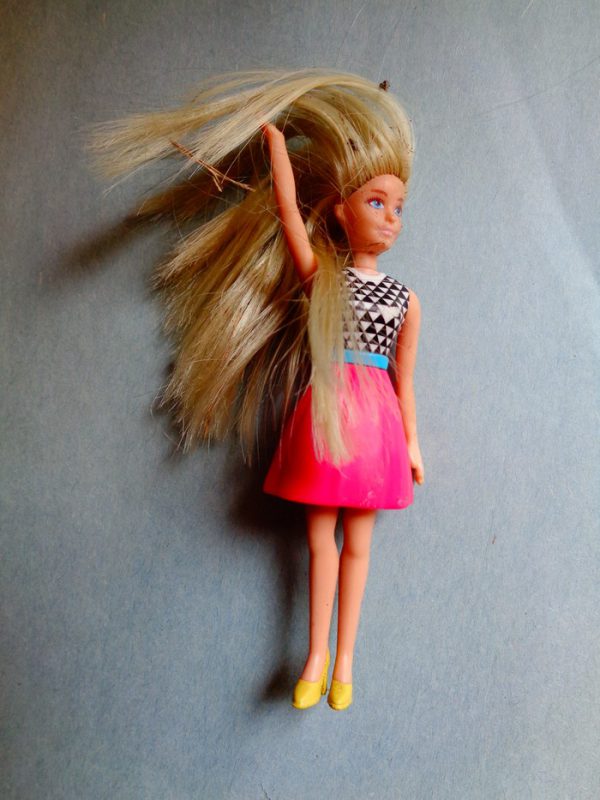The Mullins had lived on a corner lot, and it was easy to hop the fence between their backyard and the quiet street, taking turns boosting each other over. The shortest of us went first, and the tallest—tall enough to scramble over on her own—went last. Gathered again on the other side, the ambient music of summer insects seemed heightened, their conductor raising his arms in crescendo. The weeds along the three-sided fence had spread inward and upward: dandelions and tall grasses starting to seed, scalloped and jagged broadleafs that belonged on a jungle floor. A bush of nettles and trumpet-shaped purple flowers towered regally over the rest. The lowered blinds and creeping mold in the window corners made the house seem abandoned longer than the two months since it had gone up for sale.
It was August. Katie Mullins’ parents were gone to parts unknown, and our parents had stopped murmuring such a tragedy, can’t imagine every time they crossed paths. The dead baby had fascinated us all summer, blending in our minds with the cherubs painted on our Sunday school wall. We imagined little Katie Mullins sprouting angel wings and a full head of golden ringlets, her baby blanket twisted modestly around her waist, downcast eyes and a playful smile. One of us had read that victims of carbon monoxide poisoning sometimes look healthy and alive, because the end product of the gas turns blood vessels bright red, a rosy glow lighting up their skin from within.
We gravitated towards the toys scattered in the singed grass near the back door, moving in a group, giggling. An underinflated soccer ball yielded to our poking fingers. A basket of beach and pool toys were netted together by spider webs, still gritty with sand from some distant place.
We paused beside a toy stroller, two hammocks of pink fabric in a pink plastic frame, a baby doll nestled inside. The doll was turned onto its side, the arms and legs drawn up, a realistic sleeping pose despite her painted, forever-open eyes. Her felt pajamas had been bleached by the sun, the pink stripes faded to nearly the same shade as the white ones. Someone had tucked a patterned burp cloth over her lap as a blanket.
One of us lifted the doll out of the shade of her stroller, adjusted her articulated shoulders and neck so she was reaching out to be held. Her fingers and feet were molded in a curled shape, loose fists and tucked-under toes. We took turns cradling her in our arms, positioning her sitting upright in our laps, cooing, burping her, saying, “Oh, she’s crying,” though her face remained locked in its sleepy pout. The sunlight reflected off the pink nightcap and gown, giving the doll a faint blush upon its plastic cheeks. Some of us had the exact same doll at home.
When we agreed that the doll had settled, that her fussing had stopped, we swaddled her in the burp cloth and headed to a shaded corner of the yard, where the Mullins’ dog used to dig holes to sit in on hot days, the earth still churned up and soft. We cut into the ground with Katie’s beach toys, lifting out neat heaps and setting them aside until we’d dug an ovoid hole—a deep, cool resting place the Mullins’ dog would have loved.
We lowered the doll into the hole. Her blank, contented face was turned up to the sky. We sang songs over her, lullabies and folk songs that had been sung to us. We smeared our dresses and shoes with dirt to make them darker, more fitting for the occasion. We held hands and wailed. We decapitated flowering weeds around the yard and laid them over the doll, dandelions that still had their canary-blond hair, the purple trumpets, tiny white chickweed buds.
We filled the hole back in with our plastic buckets, shovels, forks, sifters, and spades, patting over the mound it left. We climbed back over the fence and scattered home with various excuses or no excuse at all for being so filthy. We sat in our bathtubs, at our dinner tables. We whispered to our dolls, still aboveground, still in our beds, still falling into the crack between the wall and the radiator, still getting their hair cut and their outfits stripped to reveal their stark stitched anatomy, still getting mashed against our faces at night. We told them to be grateful.
♦
Kim Fu is the author of the novels The Lost Girls of Camp Forevermore and For Today I Am a Boy, as well as the poetry collection How Festive the Ambulance. Find her online at kim-fu.com.
♦♦♦
Up Next:
 “Cultures lathered like paint, higgledy piggeldy, on a practice canvas…”
“Cultures lathered like paint, higgledy piggeldy, on a practice canvas…”



